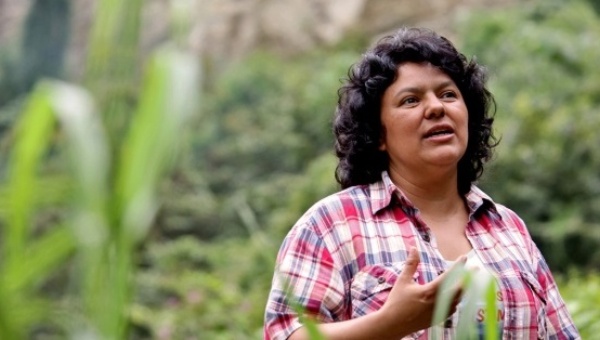
Berta Caceres, the coordinator and co-founder of the Council of Indigenous Peoples of Honduras, or COPIHN, was killed by unknown assailants early Thursday morning at 1:00 a.m. local time inside her home in La Esperanza in the western province of Intibuca.
Caceres was leader of the Lenca Indigenous community and was a staunch human rights defender. She won the prestigious Goldman Environmental Prize in 2015. Her assassination has rapidly sent shock waves across the country and sparked outrage over her death.
“Berta Caceres is one of the leading indigenous activists in Honduras. She spent her life fighting in defense of indigenous rights, particularly to land and natural resources,” said Karen Spring, Honduras-based coordinator of the Honduras Solidarity Network, in a statement. “Her death will have a profound impact on the many Lenca communities that she worked with, COPINH, the Honduran social movement, and all that knew her.”
The attackers waited until the victim went to sleep before breaking into her house and assassinated her. Her brother was injured during the attack, according to local reports.
According to Spring, who spoke to teleSUR by phone from La Esperanza, Caceres’ family and COPINH demand an independent, international investigation that is not led by Honduran officials, the Organization of American States, or the newly launched OAS and government-backed anti-corruption body known as Maccih.
“They want a thorough investigation, they don’t want it to remain in impunity, and they obviously remain very skeptical that the police and the Honduran government will adequately respond and do a thorough investigation,” said Spring.
Caceres was a key leader in a Lenca struggle against the Agua Zarca Dam, a controversial development project in the community of Rio Blanco that was put in motion without consent from local communities. She, along with other residents, led a successful campaign to halt the construction of the dam, but the community has continued to face systematic harassment.
As Adrienne Pine, anthropologist professor at American University, described Caceres as a “powerhouse” and a key figure in fighting racist and exploitative policies and projects that threatened Indigenous rights in the name of corporate profit.
“She was a leader of the popular resistance movement against the 2009 coup, and never stopped fighting,” Pine, who considered Caceres a dear friend, told teleSUR. “Even when she had to go underground to hide from the illegitimate Honduran government’s attempts to criminalize her activism, even when faced with multiple — obviously credible — death threats.”
Caceres’s fellow COPINH leader Tomas Garcia was shot dead in a peaceful protest in 2013. Caceres also faced a slew of repeated death threats and other harassment from state security forces and the company behind the dam project. There have also been past reports that hitmen were hired to assassinate her.
Last month, COPINH issued an alert noting that repression against the Rio Blanco community, including Caceres, had spiked once again. They condemned the harassment and threats community members received for participating in protests and walking to the Gualcarque River, where Agua Zarca planned to build the dam.
“People that have been following the land sturggles and terrirotiral defense that COPINH has been involved with know that violence and threats have increased in the last couple of weeks against Berta Caceres and against COPINH and lenca communities,” said Spring.
The alert also highlighted the fact that Caceres was protected under precautionary measures from the Inter-American commission for Human Rights.
“Neither precautionary measures from the IAHRC nor the prestigious Goldman Environmental Prize were sufficient to protect her from the violence of the U.S.-supported militarized Honduran state, which along with the corporations she fought is responsible for her murder,” said Pine.
Honduran security minister Julian Pacheco said in a press conference Thursday that the police were responsible for protecting Caceres and had coordinated measures with her. However, when asked, Pacheco did not admit that security forces had “failed” in their job to protect the activist.
But Rio Blanco wasn’t the only struggle that Caceres was involved in.
“It’s important for people to remember what an important activist she is both for indigenous rights and human rights, not just for the Lenca people, not just for Indigenous people from Honduras, but the the entire Honduran social movement,” said Spring. “Her role in the resistance after the military coup was incredibly important.”
Since the 2009 coup against democratically-elected President Mel Zelaya, the human rights situation in Honduras has deteriorated gravely as human rights defenders and social movements have been systematically criminalized.
It remains unclear who was behind the assassination.
“She is such an important and strategic leader of the honduran social movement and she has been for her entire life,” said Spring. “So this was a very strategic decision by the Honduran state and her killers to get rid of somebody that is so important for the honduran social movement on so many levels.”
According to Global Witness, Honduras is one of the most dangerous and deadly places in the world for land and environmental rights defenders.
There is widespread outrage and indignation across Honduras over Caceres’ assassination.
While Caceres’ community and movement are in mourning, there is also no doubt that they will continue to carry on the legacy of Caceres’ struggle.

